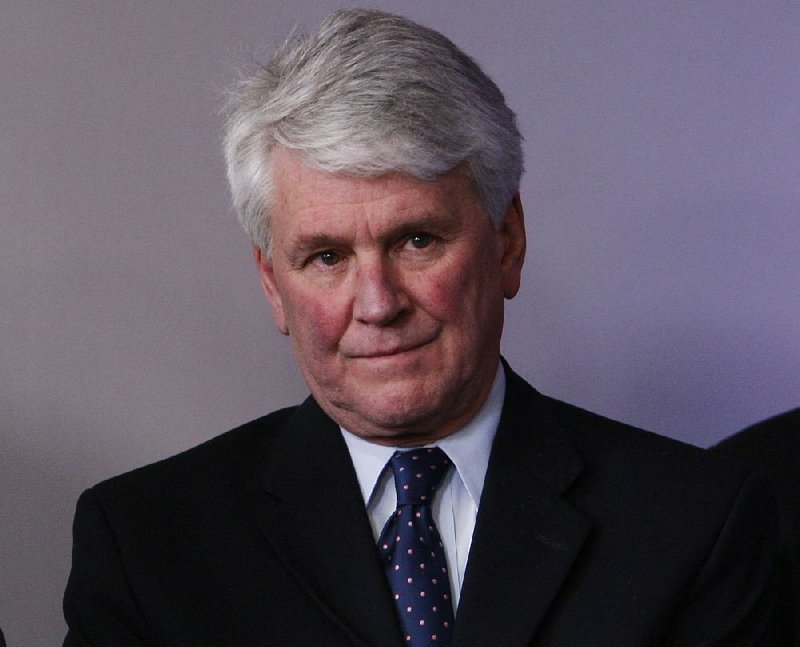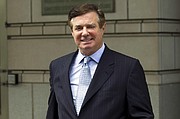WASHINGTON -- Greg Craig, a White House counsel in President Barack Obama's administration, was charged Thursday with lying to the Justice Department and concealing information about work he did in 2012 for the Russia-aligned government of Ukraine.
The indictment of Craig, 74, stemmed from an investigation initiated by the office of special counsel Robert Mueller.
Craig, who is set to appear in federal court today, is a prominent Washington attorney and was the first White House counsel to Obama. In private practice, his clients have included former North Carolina Sen. John Edwards and James Cartwright, the former vice chairman of the Joint Chiefs of Staff, who was charged in a leaks investigation. He also led President Bill Clinton's White House legal team during his impeachment proceedings and defended Clinton during his Senate trial.
In a video statement, Craig said the prosecution against him was "unprecedented and unjustified" and that he's confident a judge and jury would agree.
"I did not participate in a scheme to mislead the government or conceal material facts," he said.
Before the indictment, Craig's lawyers asserted that the case against their client was flimsy, pointing out that Mueller's team referred it to federal prosecutors in Manhattan last year for potential prosecution related to foreign lobbying laws, but that they did not file charges. Instead, the case was moved in January to Washington.
In a statement Thursday, Craig's lawyers, William Taylor and William Murphy, called the indictment unfair and misleading and said it ignores evidence showing that Craig did not mislead the Justice Department about the need for him to register under the law governing foreign lobbying.
"Mr. Craig had no interest in misleading the FARA Unit because he had not done anything that required his registration," the lawyers said, referring to part of the Justice Department that oversees the law, the Foreign Agents Registration Act. "That is what this trial will be all about."
While the charges stem from the Justice Department's decision to crack down on illegal foreign lobbying, the government did not accuse Craig of violating foreign lobbying laws.
Craig was charged with lying to federal prosecutors who work in the Justice Department's unit that oversees the registry of lobbyists and others who do work on behalf of foreign governments.
He was also charged with concealing information about the work that he did on behalf of Ukraine.
The U.S. attorney's office in Washington, D.C., worked on the case with the Justice Department's national security division and FBI agents in New York.
Since the start of the Mueller investigation, the Justice Department has been prioritizing the enforcement of the Foreign Agents Registration Act. The law has been the basis for charges brought against several people investigated by the special counsel.
Craig is accused of lying about elements of the work he did in 2012, while he was a partner at Skadden, Arps, Slate, Meagher & Flom, on behalf of the government of Viktor Yanukovych, then the president of Ukraine.
The work was steered to Craig and Skadden by Paul Manafort, who was then a political consultant earning huge paydays from clients in former Soviet states. Manafort, who went on to become President Donald Trump's campaign chairman in 2016, was sentenced last month to a total of 7½ years in prison on charges filed by Mueller's team related to obstruction of justice and violations of the Foreign Agents Registration Act, as well as banking and tax laws stemming from his work in Ukraine.
Manafort arranged for Skadden to be paid more than $5.2 million in 2012 and 2013, primarily from a Ukrainian oligarch, to assist the Ukrainian Justice Ministry. Specifically, Craig and his team produced a report that Manafort tried to use to quell Western criticism of the prosecution and jailing by Yanukovych's government of one of his rivals, former Prime Minister Yulia Tymoshenko, and to train Ukrainian prosecutors handling matters related to the case.
The indictment made public Thursday says Craig did not want to register under the Foreign Agents Registration Act because doing so could keep him or others at his law firm from getting government positions and because the filing would require him to disclose the millions paid from a "private, wealthy Ukrainian." The disclosures also would have undermined the authority of the supposedly independent report.
To help hide the private funding, Craig is accused of backdating and falsifying invoices at Manafort's request to make it appear the Ukrainian government was the sole funder of the report.
After the report was released, and Craig was quoted discussing it in an article in The New York Times, the Justice Department unit that oversees the Foreign Agents Registration Act reached out to Skadden to ask why the firm and its lawyers had not registered as foreign agents for the Ukrainian government.
The department initially concluded in 2013 that Skadden was obligated to register. But it reversed itself the next year after Craig made the case that the law did not apply to his work on behalf of Ukraine.
After the initial determination, Craig wrote to the Justice Department that he and Skadden did not proactively reach out to media outlets to disseminate and promote the report, but rather distributed it only "in response to requests from the media," according to a letter quoted by prosecutors in a January court filing.
"The only time we responded, was to correct misinformation," Craig wrote. The firm then wrote a letter to the department's Foreign Agents Registration Act unit containing Craig's statements, which ultimately allowed for him and the firm to avoid registering, the indictment said.
Years later, when the subject came up again during the Mueller probe, the indictment says Craig repeated some of the same statements during an October 2017 interview with the special counsel's team.
Prosecutors contend Craig lied, and they quoted emails showing he reached out to a journalist to offer to provide the report and discuss it.
Craig left Skadden last year as scrutiny of his work with Manafort escalated and after a former associate of the firm pleaded guilty to lying to investigators about his work on the effort.
Skadden reached a settlement in January with the Justice Department's national security division to avoid prosecution in the matter in exchange for an agreement to pay $4.6 million, to retroactively register its Ukraine work under the Foreign Agents Registration Act, to beef up its compliance processes and to cooperate with government investigations of the work on behalf of Ukraine.
Information for this article was contributed by Kenneth P. Vogel and Katie Benner of The New York Times; and by Eric Tucker, Chad Day, Michael Balsamo and Desmond Butler of The Associated Press.
A Section on 04/12/2019

